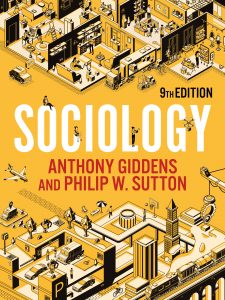In this feature essay, Phil Sutton takes readers inside the writing of the ninth edition of Polity’s flagship sociology textbook, Sociology, co-authored with Anthony Giddens. He discusses the evolution of the textbook to reflect the way sociology is practised and taught in 2021, the selection of new subjects and research methods to cover in the book and the process of revising and reviewing the content.
Sociology (9th edition). Anthony Giddens and Philip W. Sutton. Polity. 2021.
 When the first edition of Polity’s flagship sociology textbook, snappily titled Sociology, was published in 1989, I was an undergraduate student and I bought it. Honestly, I really did. At that time the book was very much Tony Giddens’s individual take on what sociology was, is and could/should be. And very good it was. I used it a lot. The textbook is in its ninth incarnation this year and there have been many changes over the intervening editions. But perhaps the most notable shift has been in the overall character of the book. It has become much less one sociologist’s assessment of the discipline and much more an overview of sociology for undergraduate students and an interactive teaching resource for instructors. My first involvement in producing this book came with the sixth edition (2009) and it has been joint-authored ever since.
When the first edition of Polity’s flagship sociology textbook, snappily titled Sociology, was published in 1989, I was an undergraduate student and I bought it. Honestly, I really did. At that time the book was very much Tony Giddens’s individual take on what sociology was, is and could/should be. And very good it was. I used it a lot. The textbook is in its ninth incarnation this year and there have been many changes over the intervening editions. But perhaps the most notable shift has been in the overall character of the book. It has become much less one sociologist’s assessment of the discipline and much more an overview of sociology for undergraduate students and an interactive teaching resource for instructors. My first involvement in producing this book came with the sixth edition (2009) and it has been joint-authored ever since.
Clearly sociology as it is practised and taught in 2021 is very different from 1989, or even 2001 for that matter, and a book like this has to reflect that. The ninth edition of Sociology has much more on contemporary subjects such as digital technology and surveillance, postcolonial theory and research, gender and gender fluidity, sexualities, intersectional inequalities, global warming and environmental issues, race and ethnicity, disability theory and politics, social movements, epidemics and pandemics, war and genocide as well as globalisation. These subjects didn’t just ‘appear’ this time round, but have been introduced over several editions as they have made their way into undergraduate teaching programmes. The same can be said of emerging research methods and methodologies such as visual sociology, digital sociology, biographical methods and the use of social media. As the book is a guide to the many specialist fields of sociology, it is important that we follow what is happening ‘on the ground’, as it were, if the book is to remain useful for teachers. We even have material on the COVID-19 pandemic and the sociological issues that are emerging from it.

However, between authors and editor, we also discuss what we think the book may be lacking and how this can be rectified. Over the years, we have added new subjects that we became convinced students needed to get to grips with. For example, in the sixth edition, we added new chapters on ‘nations, war and terrorism’ and ‘the life course’, devoted an entire chapter to ‘the environment’ for the first time and we included a significant section on social movements. In the eighth edition, after feedback from teachers, we added a major section on the philosophy of the social sciences.
Other subjects become outmoded or just slide off teaching agendas, so we have to deal with them accordingly. The study of organisations and institutions, for instance, has become less central and a whole chapter can no longer be justified, though the most significant aspects of this field – such as social networks – are still scattered across the book.
As should already be clear, the content of this book – what actually makes it into any new edition – is the outcome of a research and decision-making process that involves many people. It would be more efficient, less contentious and much quicker if all the decisions were simply left to me, but strangely, no one seems keen on that idea (except me). Outlining some of the stages involved in designing and writing each new edition may shed some light on how the content comes together and why this book takes so long to get into print.
A cursory look back over previous editions will show that the book is revised and updated on a (roughly) four-year cycle that allows it to keep abreast of the latest cultural, political, social and economic developments. The ninth edition, for example, now covers the rise of national populist movements and political parties, Black Lives Matter activism and postcolonial ideas and it also includes recent (and often hostile) discussions between transgender theorists and activists and some feminists.
Four years might seem like a long time to work on the next version, but over that period there is a lot to do. When the latest book has been available for around one year, our editor and the Polity team take soundings on the edition, especially from instructors who use it in their teaching. Most of these sociologists work in UK universities, with a smaller number from other countries in which translations of the book are available. This survey is really important as it helps us to understand how the book is actually used and for what purposes. For instance, we’re always interested in whether the block of chapters on the history of sociology, theoretical perspectives and research methods are used together, and which other chapters are most useful for first-year undergraduate teaching. It’s also helpful to know if the interactive features of the book, such as the end-of-chapter review materials, are doing their job. All feedback from this survey is collated and it usually falls on me to suggest what we might take from it. This is then shared, discussed, amended and a general agreement is reached between authors and publisher. A report on what the next edition will look like is prepared for the Polity Board and a detailed timeline for the work is carefully drafted ahead of contract signing, before the research begins in earnest.
As soon as each draft chapter is produced, and while we work on the next one, it is sent to two experts in that field for assessment. Usually at least one of the reviewers works at the ‘cutting edge’ of their field and often they tell us that we need to include things we haven’t even considered. This can be tricky. Do first-year undergraduates really need to be exposed to the very latest, often highly complex, research and its findings? The second reviewer is usually someone involved in undergraduate teaching who can help us to answer that question with more confidence. Taking the two reviews together is incredibly helpful and the reviewers make recommendations and suggestions for improvement that are, in the vast majority of cases, constructive and supportive. Usually. On occasion, one reviewer will tell us the chapter is virtually worthless, while the other loves it beyond words.
Then we go to a third review – a sort of sociological VAR – for adjudication before we start hitting the delete button. This process is continuous and goes on, and on, for 22 chapters. Can you imagine just how bruised and increasingly fragile our social selves have become by the end? And that’s before the cold reader, proof-reader and copy editor start to pick apart our spelling, grammar and sentence construction. Yet all of that is quickly forgotten once I get the first hardcopy in hand and see what a great job the graphic designers and production team have made of the plain text and statistical data. Then comes the sad part where I get time off for good behaviour before starting on the two companion volumes: Essential Concepts and Introductory Readings. Can’t wait.
Note: This feature essay gives the views of the author, and not the position of the LSE Review of Books blog, or of the London School of Economics.
Photo by mauro mora on Unsplash.








Read one of the editions as UG Sociology student in India between 1995-1998. Have used it for teaching in the 2000s. This book remains a text in global south context as well. Hope the new edition and those to follow will have examples and theories of social living from the global south particularly South Asia